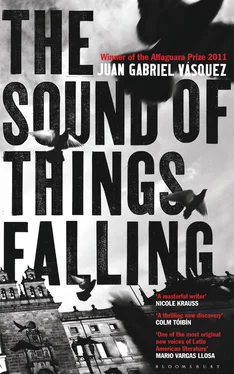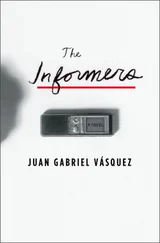He knew very well.
He knew very well, having received the phone call twelve hours before arriving at Villa Elena that gave him the news, and in an urgent and then threatening tone demanded explanations. And he couldn’t give any, of course, because nobody could explain how DEA agents were waiting for Ricardo in the very spot he landed, or how the two dealers — one from Miami Beach, the other from the university zone of Massachusetts — waiting for Ricardo’s shipment in a covered Ford pick-up truck hadn’t noticed their presence. It was said that Ricardo was the first to notice that something was wrong. It was said that he tried to get back to the cockpit, but he must have realized his effort would be futile, for he’d never be able to get the Cessna in motion in time to escape. So he ran down the runway towards the woods that surrounded it, chased by two agents and three German shepherds who caught up with him 30 metres from the edge of the woods. He had already lost at the moment of running off, it was obvious that he’d lost, and that’s why no one could explain what happened next. It’s possible to think it was out of fear, a reaction to the moment’s vulnerability, to the agents’ shouts and to their own weapons pointing at him, or perhaps it was out of despair or rage or powerlessness. Of course, Ricardo couldn’t have thought that firing a random shot could help him in any way, but that’s what he did, using a.22-calibre Taurus he’d started carrying in January: it was a random shot and only one shot, over his shoulder without bothering to aim and with no desire to hurt anyone, with such bad luck that the bullet pierced the right hand of one of the agents, and that same hand in a plaster cast would be enough later, during the trial for drug trafficking, to increase the sentence, even though it was a first offence. Ricardo dropped the Taurus on the way into the woods and shouted something, they say he shouted something, but those who heard him didn’t understand what he said. When the dogs and the second agent found him, Ricardo was lying in a puddle with a broken ankle, his hands black with dirt, his clothes torn and covered in pine gum and his face disfigured by sadness.
Adulthood brings with it the pernicious illusion of control, and perhaps even depends on it. I mean that mirage of dominion over our own life that allows us to feel like adults, for we associate maturity with autonomy, the sovereign right to determine what is going to happen to us next. Disillusion comes sooner or later, but it always comes, it doesn’t miss an appointment, it never has. When it arrives we receive it without too much surprise, for no one who lives long enough can be surprised to find their life has been moulded by distant events, by other people’s wills, with little or no participation from their own decisions. Those long processes that end up running into our life — sometimes to give it the shove it needed, sometimes to blow to smithereens our most splendid plans — tend to be hidden like subterranean currents, like tiny shifts of tectonic plates, and when the earthquake finally comes we invoke the words we’ve learned to calm ourselves, accident, fluke , and sometimes fate . Right now there is a chain of circumstances, of guilty mistakes or lucky decisions, whose consequences await me around the corner; and even though I know it, although I have the uncomfortable certainty that those things are happening and will affect me, there is no way I can anticipate them. Struggling against their effects is all I can do: repair the damage, take best advantage of the benefits. We know it, we know it very well; nevertheless it’s always somewhat dreadful when someone reveals to us the chain that has turned us into what we are, it’s always disconcerting to discover, when it’s another person who brings us the revelation, the slight or complete lack of control we have over our own experience.
That’s what happened to me over the course of that second afternoon at Las Acacias, the property formerly known as Villa Elena, whose name no longer suited it one fine day and had to be urgently replaced. That was what happened to me during that Saturday night when Maya and I were talking about the documents in the wicker chest, about every letter and every photo, about every telegram and every bill. The conversation taught me all that the documents hadn’t confessed, or rather organized the contents of the documents, gave an order and a meaning and filled in a few of its gaps, although not all of them, with the stories that Maya had inherited from her mother in the years they lived together. And also, of course, with the stories her mother had made up.
‘Made up?’ I said.
‘Oh, yeah,’ said Maya. ‘Starting with Dad. She invented him entirely, or rather, he was an invention of hers. A novel, understand? A flesh-and-blood novel, her novel. She did it because of me, of course, or for me.’
‘You mean you didn’t know the truth?’ I said. ‘Elaine didn’t tell you?’
‘She must have thought it would be better that way. And maybe she was right, Antonio. I don’t have children. I can’t imagine what it’s like to have children. I don’t know what a person might be capable of doing for them. My imagination doesn’t stretch that far. Have you got kids, Antonio?’
Maya asked me that. It was Sunday morning, that day Christians call Easter and on which they celebrate or commemorate the Resurrection of Jesus of Nazareth, who had been crucified two days before (more or less at the same time as I began my first conversation with Ricardo Laverde’s daughter) and who from this moment on began to appear to the living: to his mother, to the Apostles and to certain women well chosen for their merit. ‘Have you got kids, Antonio?’ We’d had an early breakfast: lots of coffee, lots of freshly squeezed orange juice, lots of chunks of papaya and pineapple and sapodilla plums, and a cooked breakfast with a very hot arepa , which I put in my mouth too hot and left a blister on my tongue that came back to life every time my tongue touched my teeth. It wasn’t hot yet, but the world was a place that smelled of vegetation, humid and colourful, and there, at the table on the terrace, surrounded by hanging vines, talking a few metres from a trunk with some bromeliads growing out of it, I felt good, I thought I was feeling good on this Easter Sunday. ‘Have you got kids, Antonio?’ I thought of Aura and Leticia, or rather I thought of Aura taking Leticia to the closest church and showing her the candle that represented the light of Christ. She’ll take advantage of my absence to do it: in spite of several attempts, I was never able to recover the faith I had as a little boy, much less the dedication with which my family followed the rituals of these days, from the ashes on the forehead on the first day of Lent to the Ascension (which I pictured in my head according to an encyclopedia illustration, a painting full of angels that I’ve never found since). And I had therefore never wanted my daughter to grow up in this tradition, which now seemed so alien to me. Where are you, Aura? I thought. Where is my family? I looked up, let myself be dazzled by the clarity of the sky, felt a stabbing in my eyes. Maya was looking at me, waiting, hadn’t forgotten her question.
‘No,’ I said, ‘I don’t. It must be very strange, having kids. I can’t imagine it either.’
I don’t know why I did that. Maybe because it was too late to start talking about the family that was waiting for me in Bogotá; those are things you mention in the first moments of a friendship, when you introduce yourself and hand over two or three pieces of information to give the illusion of intimacy. One introduces oneself: the word must come from that, not pronouncing one’s own name and hearing the other’s name and shaking hands, not from kissing a cheek or two or bowing, but from those first minutes in which certain insubstantial pieces of information are exchanged, certain unimportant generalities, to give the other the sensation they know us, that we’re no longer strangers. We speak of our nationality; we speak of our profession, what we do to make a living, because the way we make our living is eloquent, it defines us, structures us; we talk about our family. Well anyway, that moment was already long past with Maya, and to start talking about the woman I lived with and our daughter two days after having arrived at Las Acacias would have raised unnecessary suspicions or required long explanations or stupid justifications, or simply seemed odd, and after all it wouldn’t be without consequences: Maya would lose the trust she’d felt until now, or I would lose the ground I’d gained so far, and she would stop talking and Ricardo Laverde’s past would go back to being the past, would go back to hiding in other people’s memories. I couldn’t allow that.
Читать дальше












